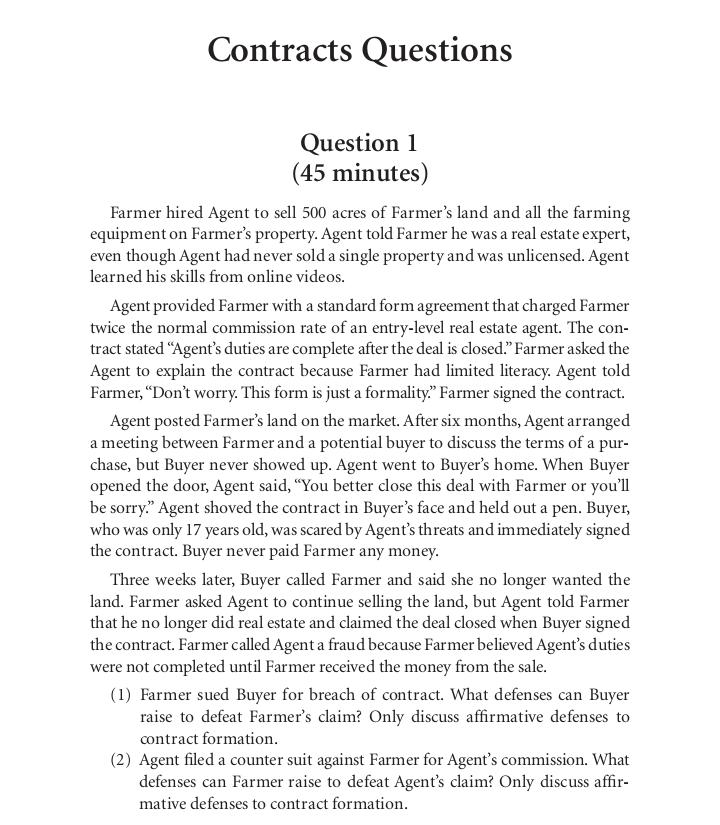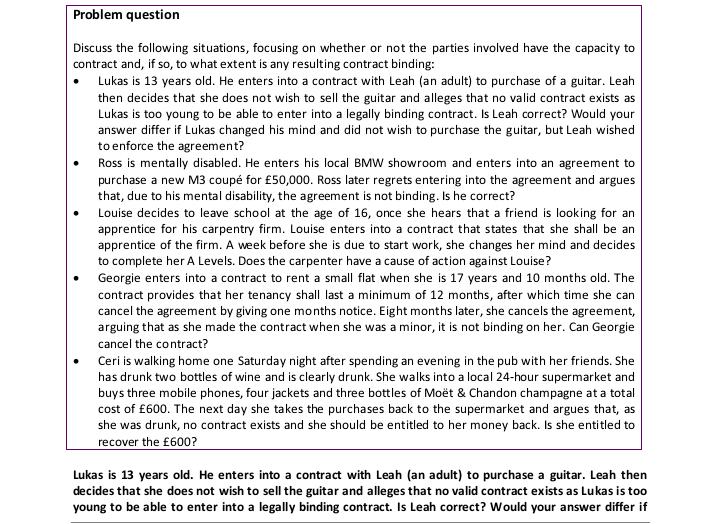





Hello tutors..
Contracts Questions Question 1 (45 minutes) Farmer hired Agent to sell 500 acres of Farmer's land and all the farming equipment on Farmer's property. Agent told Farmer he was a real estate expert, even though Agent had never sold a single property and was unlicensed. Agent learned his skills from online videos. Agent provided Farmer with a standard form agreement that charged Farmer twice the normal commission rate of an entry-level real estate agent. The con- tract stated "Agent's duties are complete after the deal is closed." Farmer asked the Agent to explain the contract because Farmer had limited literacy. Agent told Farmer, "Don't worry. This form is just a formality." Farmer signed the contract. Agent posted Farmer's land on the market. After six months, Agent arranged a meeting between Farmer and a potential buyer to discuss the terms of a pur- chase, but Buyer never showed up. Agent went to Buyer's home. When Buyer opened the door, Agent said, "You better close this deal with Farmer or you'll be sorry." Agent shoved the contract in Buyer's face and held out a pen. Buyer, who was only 17 years old, was scared by Agent's threats and immediately signed the contract. Buyer never paid Farmer any money. Three weeks later, Buyer called Farmer and said she no longer wanted the land. Farmer asked Agent to continue selling the land, but Agent told Farmer that he no longer did real estate and claimed the deal closed when Buyer signed the contract. Farmer called Agent a fraud because Farmer believed Agent's duties were not completed until Farmer received the money from the sale. (1) Farmer sued Buyer for breach of contract. What defenses can Buyer raise to defeat Farmer's claim? Only discuss affirmative defenses to contract formation. (2) Agent filed a counter suit against Farmer for Agent's commission. What defenses can Farmer raise to defeat Agent's claim? Only discuss affir mative defenses to contract formation.Georgie enters into a contract to rent a small flat when she is 17 years and 10 months old. The contract provides that her tenancy shall last a minimum of 12 months, after which time she can cancel the agreement by giving one months notice. Eight months later, she cancels the agreement, arguing that as she made the contract when she was a minor, it is not binding on her. Can Georgie cancel the contract?Problem question Discuss the following situations, focusing on whether or not the parties involved have the capacity to contract and, if so, to what extent is any resulting contract binding: Lukas is 13 years old. He enters into a contract with Leah (an adult) to purchase of a guitar. Leah then decides that she does not wish to sell the guitar and alleges that no valid contract exists as Lukas is too young to be able to enter into a legally binding contract. Is Leah correct? Would your answer differ if Lukas changed his mind and did not wish to purchase the guitar, but Leah wished to enforce the agreement? Ross is mentally disabled. He enters his local BMW showroom and enters into an agreement to purchase a new M3 coupe for $50,000. Ross later regrets entering into the agreement and argues that, due to his mental disability, the agreement is not binding. Is he correct? Louise decides to leave school at the age of 16, once she hears that a friend is looking for an apprentice for his carpentry firm. Louise enters into a contract that states that she shall be an apprentice of the firm. A week before she is due to start work, she changes her mind and decides to complete her A Levels. Does the carpenter have a cause of action against Louise? Georgie enters into a contract to rent a small flat when she is 17 years and 10 months old. The contract provides that her tenancy shall last a minimum of 12 months, after which time she can cancel the agreement by giving one months notice. Eight months later, she cancels the agreement, arguing that as she made the contract when she was a minor, it is not binding on her. Can Georgie cancel the contract? Ceri is walking home one Saturday night after spending an evening in the pub with her friends. She has drunk two bottles of wine and is clearly drunk. She walks into a local 24-hour supermarket and buys three mobile phones, four jackets and three bottles of Moet & Chandon champagne at a total cost of $600. The next day she takes the purchases back to the supermarket and argues that, as she was drunk, no contract exists and she should be entitled to her money back. Is she entitled to recover the f600? Lukas is 13 years old. He enters into a contract with Leah (an adult) to purchase a guitar. Leah then decides that she does not wish to sell the guitar and alleges that no valid contract exists as Lukas is too young to be able to enter into a legally binding contract. Is Leah correct? Would your answer differ if1. Paul filed a lawsuit for false imprisonment against Dan's Bookstore. During a visit to Dan's Bookstore, Dan stopped Paul as he left the store. Dan accused Paul of stealing a book from the store. After briefly looking into Paul's shopping bag, Dan determined that Paul did not shoplift. He apologized to Paul and released him. On these facts, Dan will likely: a. win the case, because the shopkeepers privilege statute gives store merchants unconditional immunity (protection) from such lawsuits. b. lose the case, because Paul did not shoplift. C. win the case, but only if a court or trier of fact concludes that Dan had reasonable cause to believe Paul may have shoplifted, detained him for a reasonable time, and in a reasonable manner. d. lose the case, because Dan did not have a warrant. 2. Bonds wrote McGuire, "I will sell you my house and lot at 419 West Lombard Street, San Francisco, California for $950,000 payable upon merchantable deed, deal to be completed within 60 days of the date of your acceptance." Assuming that Bonds' letter contains terms which are deemed sufficiently certain and definite, which of the following statements is correct? a. Bonds' letter is not an offer unless Bonds intended it to be an offer. b. Bonds' letter is not an offer unless McGuire thought Bonds intended to make an offer. C. Bonds' letter is an offer if a reasonable person with full knowledge of the circumstances would be justified in thinking it was intended as an offer.. d. Bonds' letter is not a offer unless both Bonds and McGuire considered it as an offer. 3. Iverson Jewelers wrote a letter to Miller, "We have received an exceptionally fine self winding Rolox watch which we will sell to you at a very favorable price." The letter is an offer to sell. b. A valid offer cannot be made by letter. c. The letter contains a valid offer which will terminate within a reasonable time. d. The letter lacks one of the essential elements of an offer. 4. Don was negligently driving south on Merdock Avenue when his car rear-ended a car driven by Patty. The force of the impact forced Patty to rear-end Terry's car. In turn, the force of the second impact caused Terry's car to hit a lamppost, which then fell on a house owned by Paul. The force of the impact scared Paul, causing him to immediately have a heart attack. Paul sues Don for negligence. If Paul recovers, the most likely reason is: a. Paul was able to prove that Don proximately caused Paul's injuries. Paul was able to prove that the damages he suffered were actually caused by Don. . Paul was able to prove that Don breached a duty of due care owed by Don to Paul.10. Donny threw a knife at Sally, intending to injure her severely. However, Donny missed Sally. Sally saw the knife just as it whizzed by her head, missing it by about one inch. As a result, Sally was very scared. Sally sued Donny for assault and battery. Which of the following is most correct? a. Donny will be liable for battery, but not assault. b. Donny will be liable for assault, but not battery. c. Donny will be liable for assault and for battery. d Donny will not be liable for either assault or battery because this is only a criminal matter. 11. In most states the following types of contracts are within the statute of frauds. a. Contracts for the sale of an interest in personal property. b. Contracts that can be performed within a year from the date of their formation. c. Contracts for the sale of goods. Contract sfor the sale of goods for a price of $500 or more. 12. On May 1, 2005, Eckerly Realty Inc. mailed a written offer to Masse for the sale of an office building. The offer included an express term that it would expire on June 30, 2005 if the acceptance was not delivered into the hands of the offeror by the expiration date. On June 30, 2005 at 8:00 a.m., Masse sent a written acceptance to Eckerly via Masse's personal messenger. However, the messenger was not able to deliver the acceptance until July 1, 2005. On July 2. 2005, Eckerly contacted Masse, informing him that the acceptance had been delivered one day late. As a result, Eckerly refused to honor the acceptance. Which of the following is the most correct statement? a. There is no contract between Eckerly and Masse. However, if Masse would have mailed the acceptance on June 30, 2005, a contract would have been created. b. There is a contract between Eckerly and Masse. The moment that Masse gave the acceptance to the messenger, a contract was formed because acceptances are valid immediately upon dispatch. C. There is a contract between Eckerly and Masse. The fact that the acceptance arrived only one day late is of no significance. d. There is no contract between Eckerly and Masse. 13. Which of the following statements is correct concerning the "reasonable person" standard in tort law? a. The reasonable person standard varies from person to person. b. The reasonable person standard focuses on the defendant's subjective mental state rather than on the defendant's behavior. C. A person with a physical disability must act as would a reasonable person with the same disability. d. A person with a mental disability must act as would a person with the same mental disability. 14. Robert makes the following statement while negotiating the sale of his car, "This is the sharpest car on the market." His statement may support a claim for: misrepresentation. b. fraud. C. fraud and misrepresentation. d. none of the above.Deltas is 13 years old. He enters into a contract with Leah {an adult} to purchase a guitar. Leah then he Ides that she does not wash to sell the guitar and alleges that no valid contract exists as Lulras ls too young to be able to enter into a legally binding contract. ls Leah correct? Would your answer dl'er if


















